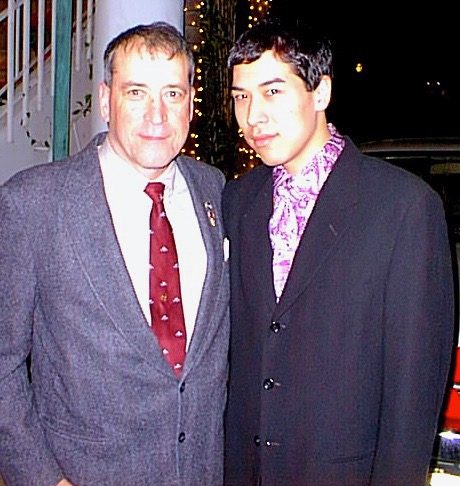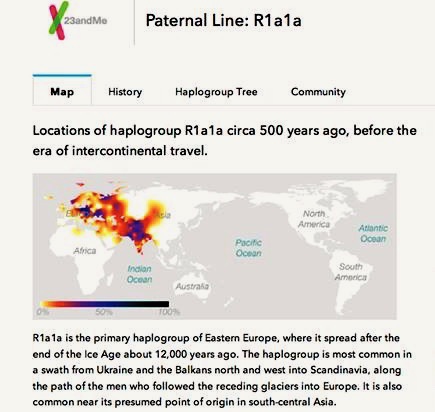Mohandus “Mahatma" Gandhi
Bill Boyarsky
In November 1943, June Sale, a UCLA student, was part of a demonstration at Los Angeles Polytechnic High School against Gerald L.K. Smith, the most prominent anti-Semite of the time.
Listening to the speeches inside the auditorium, she recalled recently, “I became nauseated and teary. I decided to leave. As I got to the foyer of the auditorium, a police officer arrested me, told me I was disturbing the meeting and walked me to the police paddy wagon.”
June when she was a girl in Sierra Madre California
I learned of her long-ago bust in one of the emails she sends to friends, often writing of her anger over where President Donald Trump is taking the country. I was intrigued by the story of her arrest, and by the picture she included of herself talking to her lawyer before going on trial, which appeared in the now-defunct Los Angeles Daily News (the one that folded in 1954, not the current Woodland Hills-based newspaper). I wanted to know more. So my wife, Nancy, and I talked with her early in April over lunch at her home above Sunset Boulevard. We have been friends since we met June and her late husband, Sam, on Barbara Isenberg’s London theater tour several years ago.
As she told the story of her life, I saw that it reflected an almost forgotten era of Jewish Los Angeles, when anti-Semitism was rampant and a beleaguered Jewish community pondered how to fight it. “It was just something that happened to me over and over again,” she recalled of the anti-Semitism of her high school days in Pasadena.
June was born at White Memorial Hospital in Boyle Heights in 1924. Boyle Heights was then home to immigrants of many ethnicities and a hotbed of Jewish progressive politics. Her parents, Ben and Bertha Solnit, were immigrants from a town on the Russian-Polish border. Ben learned the shoe business from the bottom up and grew prosperous. When their son was ill with bronchitis, his pediatrician advised them to move to a hotter, drier place. They chose Sierra Madre, near Pasadena, a center for right-wing politics and one of several communities riddled with anti Semitism.
Although Jews were among the founders of Los Angeles in the 19th century, Midwesterners who made the growing city a white Protestant conservative place soon outnumbered them. Restrictive covenants kept Jews — and African-Americans, Asians and Latinos — from some neighborhoods. Clubs would not admit Jews nor would fancy downtown law firms hire them.
In high school, June said, “all my friends who were not Jewish joined sororities and they were told not to talk to me.” When she was elected president of a student YWCA group in junior high school, a vice principal said she could not accept the job because the group recited Christian prayers and Jews could not join them.
The Solnits wouldn’t take it. “I’m a better citizen then you’ll ever be,” Bertha Solnit told another school vice principal when he refused to permit June to use transfer credits to graduate and lectured Bertha on what he considered the citizenship obligations of immigrants.
Their determination to fight anti-Semitism, as well as their liberal political views, put the Solnits firmly in the ranks of pro-labor, progressive Jews — usually immigrants or children of immigrants. They were at odds with more politically conservative Jews who wanted to get along with the city’s Republican powers and didn’t approve of the liberal activists’ confrontational tactics with anti-Semites.
June accompanied her father to meetings of the Joint Anti-Fascist Refugee Committee, which was helping anti-Franco forces in the Spanish Civil War and campaigning to rescue Jews and other victims of Hitler. President Harry S. Truman’s Justice Department later blacklisted the committee, an action overturned by the Supreme Court.
June's father with David Ben Gurion on a trip to Israel
“The grown-ups were passionate, worried and concerned,” June wrote of the meetings. “The discussions were often difficult for me to comprehend, but I do remember the point of the gatherings was to find ways to bring refugees from Spain and Europe to safety. [President Franklin] Roosevelt had turned away Jews trying to escape the Holocaust and refugees from Spain were not welcome here.”
Liberal outrage was intense when Gerald L.K. Smith spoke at Poly High in 1943. Sam and June had married and he was overseas with the Army Air Corps. June, still at UCLA, had been on a union picket line during a strike against the studios. Impressed with her demeanor, one of the strike captains, a man named Irving, asked her to join a labor-sponsored demonstration against Smith.
June and her beloved husband Sam Sale
After her arrest, she said, “I was greeted in the paddy wagon by other ‘disturbers’ and we were whisked off to jail. The women were placed in cells with prostitutes who had been arrested. Irving had observed my arrest and soon came to my rescue. He was able to pay my bail and I was released early in the morning. Believing I would be the first person out of the dungeon, I took everyone’s phone number on a piece of toilet paper (the guard loaned us a pencil) so I could call a contact and tell what had happened.”
All of the charges were dismissed. “The police were required to identify us and they couldn’t,” she wrote in an email. “Strangely enough, we all looked quite different from the time we were arrested.”
She concluded her email about her arrest by saying, “You may ask why I bring this moment in my history up at this time. Well, I think we are headed for rough and difficult times as we face the Trump years. America First was a theme of the thirties, anti-Semitism is on the rise, the rich are getting richer, the middle class is disappearing and the poor are getting poorer. We must organize against this growing threat of ‘America First.’ ”
June graduated from UCLA. She and Sam raised a family and generously supported progressive causes, no matter how unpopular. She became a preschool teacher, started Los Angeles’ first Head Start program and was in charge of child care services at UCLA for 10 years. Then for 18 years, she was a court-appointed special advocate, going from court to court, home to home, looking after the welfare of some of the 35,000 children in the Los Angeles County foster care program.
An article June wrote for the LA Times
June and her Prius, one of the first sold in Southern CA. She still owns it.
June and Sam, with their kids. June is a many times great grandmother
In her 90's June is still passionate and still active in her life of service.
“When you get old, gray and sleepless, you may find, as I do, that your memories of days gone by keep you company,” she wrote.
Her memories keep us company, too. The issues have changed. The immigrants are no longer Jewish refugees, but Latinos and those fleeing war-torn Muslim-majority nations. Episodes of anti-Semitism are increasing. But the challenges remain the same as they were when June Sale joined the picket line at Poly High.
Watch this video of
In her mid-90's June is still making valuable differences in the lives of people and community.
BILL BOYARSKY is a columnist for the Jewish Journal, Truthdig and L.A. Observed, and the author of “Inventing L.A.: The Chandlers."
Note from Ed Garren, Below is a link to the story I wrote about June almost a decade ago. I hope you enjoy it as well.
https://edwardgarrenmft.blogspot.com/2013/01/seventh-day-june-solnit-sale.html
**************************Arms are for hugging.


































